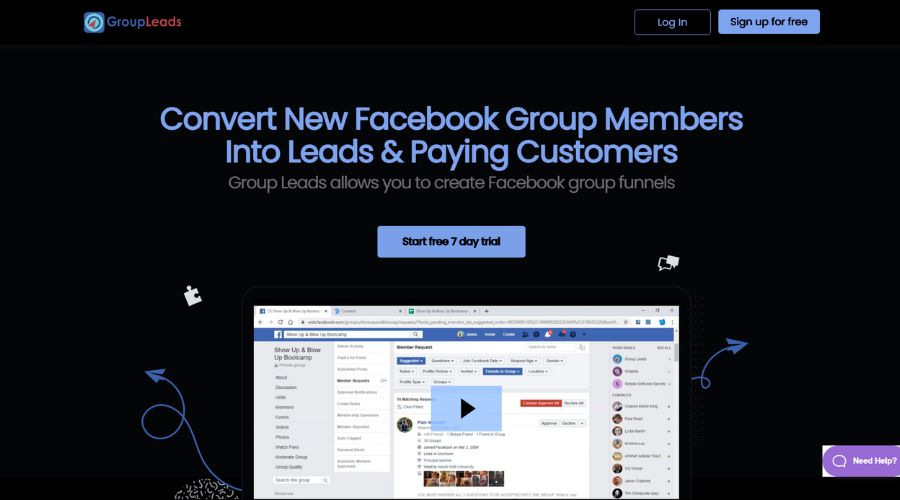Ready to take your micro-SaaS marketing game to the next level?
A SaaS product marketing manager may be what you’re looking for.
In this post, we’ll illustrate just how important product marketing is for your micro-SaaS and why you need a manager to oversee your campaigns.
You’ll also learn what qualities to look for in a product marketing manager along with their role in your company.
Let’s go right ahead and jump into the topic.
What Is a SaaS Product Marketing Manager?

As the position suggests, people with this official job title are responsible for everything related to SaaS product marketing.
From determining what issues potential customers face to which features resonate most with your users and crafting a message that shows how your product can help them, it’s a time-consuming job that requires constant monitoring of KPIs.
So if you’d rather not handle it by yourself, it might be best to hire a SaaS product marketing manager or promote one of your staff.
They can then lead the product marketing team to improve your conversion rate.
4 Benefits of Having a SaaS Product Marketing Manager
1. Increased customer acquisition
Product marketing strategies not only target specific customers but their concerns as well.
Because of this, sending the right message gives you a better shot at converting users.
Remember: the people you’re going after are actively seeking software solutions.
They want to solve their problems fast—and they’re willing to pay for it if necessary.
So, if your product and sales team work together, you can send the right message and get target customers to respond across all your marketing channels.
An experienced product marketing manager will know how to accomplish that.
2. Improved customer retention

In case you didn’t know it, retaining customers is actually less expensive than acquiring new ones.
With a SaaS product marketing manager, therefore, you can have someone on your team who can create positive experiences for your existing customers.
This person will be in charge of creating strategies that’ll keep paying customers happy and satisfied with your SaaS product.
For example, they can update your user onboarding process to address some of the frustrations customers face when using your product for the first time.
By doing so, users will have an easier time navigating your software, increasing their chances of staying.
3. Better product positioning and messaging
Plenty of software solutions nowadays aim to solve one problem, so there’s a good chance that you have at least one direct competitor.
To stand out, you’ll have to position your micro-SaaS product better in the market.
Fortunately, this is something that micro-SaaS product marketing managers can help with.
They know what type of message to send since they’re familiar with the product features that people want.
By doing this, your target users will start to understand what makes your product the better option.
4. More effective marketing campaigns

A product marketing manager can use targeted content to attract the right customers.
For example, Group Leads knows its users need an easy and inexpensive way of turning their Facebook group members into leads and paying clients, so its marketing message reflects that.
Not only do they publish the right content, but they also publish them in the right channels.
So, for your micro-SaaS business, your product marketing manager will need to research as well where and how you should build your online presence.
They can then instruct your marketing team to engage potential customers.
Whether it’s blogs, podcasts, webinars, or even case studies, your manager can narrow down your list of channels to attract potential customers.
This results in more cost-efficient marketing efforts.
Basic Skills a SaaS Product Marketing Manager Must Have
1. Understanding of the SaaS and micro-SaaS industry
SaaS users are inherently different from the average consumer.
In the SaaS industry, users expect to have the option of trying out the software first before subscribing to a monthly or yearly plan.
And since they rarely make one-time purchases, it’s your responsibility to keep them happy even after they sign up for your service.
Thus, if your product marketing manager doesn’t know these things, the chances of success decrease dramatically.
It’s vital then to find a person that has—at the very least—a basic understanding of common marketing concepts in the SaaS industry.
Otherwise, they won’t be able to develop strategies that will work for you.
2. Understanding of digital marketing

While traditional marketing and product marketing have different goals, both still depend on marketing strategies to execute.
To this end, your product marketing manager should know not only SaaS products but also the latest digital marketing technology and tactics.
For example, knowing how to use tools like Semrush or Ahrefs can help make your employees more efficient.
Remember as well that every product marketing team member will have their marketing expertise.
Hence, you need someone who can listen to their concerns and understand how to help them immediately.
3. Strong communication skills
This isn’t just true for product marketing managers; any manager needs to be good at communication.
After all, if managers cannot express themselves and motivate your team, you’ll likely not get very far.
This is because having strong communication skills helps build relationships with other stakeholders and executives.
Additionally, product marketing teams get assigned tasks all the time, so you need a manager that knows how to delegate effectively.
They need to go back and forth with teams to make sure that none of them overwork or underperform.
Communicating with customers is also a big part of the job since they need to know what your users like about your SaaS product.
Strong communicators can get that information out of them, leading to customer success.
4. Analytical skills

One of the things your product marketing manager has to do is review data to determine which direction to take your campaigns.
Consequently, they need to have analytical skills.
Data-driven decision-making is the only way they’ll be able to make informed decisions. They can’t afford to guess what people want.
They need to review market trends, customer behavior, and product usage data, among others, to improve any metrics you’re checking.
Different KPIs also dictate how to allocate resources.
If one strategy performs better than the other, it only makes sense to dedicate more people to what works.
Responsibilities of a SaaS Product Marketing Manager
1. Define and communicate the product vision and roadmap
It’s up to your product marketing manager to define and communicate your product vision and roadmap to all members of your product team.
They need to know what to expect in the next few days, weeks, and months.
They may even have regular meetings to see if the company is still on track to meet its business goals and learn of any possible roadblocks.
2. Conduct market research and gather customer feedback

Another thing that the product marketing manager is responsible for is performing market research. This includes conducting competitive analysis.
Here’s an example.
Chatsilo is a micro-SaaS company that allows you to create Messenger funnels in minutes so you never have to lose a Messenger sale again.
So if you want to compete with it, your manager must check what value Chatsilo brings to your target users to improve your SaaS product.
On top of that, your manager will have to get customer feedback to use as data for your marketing campaigns.
The simplest way of doing that would be through customer surveys and interviews.
Even an in-app pop-up window asking users to rate the product can tell you many things.
3. Prioritize features and manage the product backlog
Another thing that your SaaS product marketing manager should know is the software features that your users like.
The product feature that stands out above the rest will become the focal point of your marketing campaign, so it’s your product marketing manager’s job to determine what that is.
Managers should also keep an eye out for features that existing customers want and put them in the backlog if it’s not there yet.
The most-requested features should take priority.
Here’s a video where Google’s product marketing manager explained things further:
4. Collaborate with cross-functional teams

It is also part of a SaaS product marketing manager’s responsibilities to collaborate with other teams in the organization.
They need to talk with the sales team, customer service, and other departments to discover any potential issues that other departments might not have even known yet.
You can then use all this information to improve your services.
5. Create go-to-market strategies
Product marketing managers are also responsible for bringing attention to a product launch or new features.
They do this by looking at the competitive landscape and determining the best way to introduce a new offering.
If you’re launching a new feature, they’ll know which users need it and where to find them.
This is one of the reasons why the product marketing manager needs to work closely with the development team.
After all, they have to understand what the new product or feature does and how it can benefit users.
6. Create and manage product marketing collateral
Product marketing collateral refers to assets that the marketing team uses to promote your software.
In digital marketing, these can include white papers, infographics, help center articles, case studies, and instructional videos, among others.
Since your manager has a direct say in the product marketing strategy, it only makes sense to have them manage all your collateral as well.
They also need to ensure that all marketing materials have a consistent tone and that the message remains the same throughout.
7. Plan and execute product launches
The product marketing team is typically the one on the frontlines during product launches. To this end, the manager should be the one leading the charge.
Before launching your product, they should already have a plan to take it to the market.
Part of that includes coordinating with all the teams to ensure everything goes as smoothly as possible.
It’s just as important to have a post-launch analysis. This will tell you how the launch went and what needs to improve.
They can look at customer feedback and sales performance to get a clearer picture.
Pros and Cons of Hiring a SaaS Product Marketing Manager
Pros
- A clear product vision and roadmap — The manager can tell you, based on data, how to market your product and how long it should take to meet your goals.
- Improved product-market fit — You’ll be able to design a marketing strategy that targets the right users.
- Increased customer retention — More customers will likely continue to do business with you if you have a product marketing manager who helps continuously address their concerns and needs.
Cons
- Cost — Running a product marketing campaign can be a problem for starting micro-SaaS companies that typically lack funding, especially in the earlier stages.
- Limited resources — Not all micro-SaaS companies have the manpower to run an optimal product marketing campaign.
- Time commitment — It takes a lot of time to develop and execute marketing strategies, so anyone performing multiple roles in your company might find it overwhelming.
- Overengineering — There is a real possibility that the product marketing manager overengineers solutions to please every customer.
Final Thoughts
Clearly, there are a lot of ways that micro-SaaS companies can benefit from having a product marketing manager around.
After all, they’re there from conception to product launch (and even to post-launches) to make sure that you’re able to deliver what your customers want.
With the right strategy, they can also help you improve your customer retention, generate new leads, and have a competitive edge over business rivals.
If you need more information about SaaS product marketing, we published a comprehensive guide you’ll want to read.
But if you need help with managing your SaaS or micro-SaaS product marketing, feel free to contact us as well.

